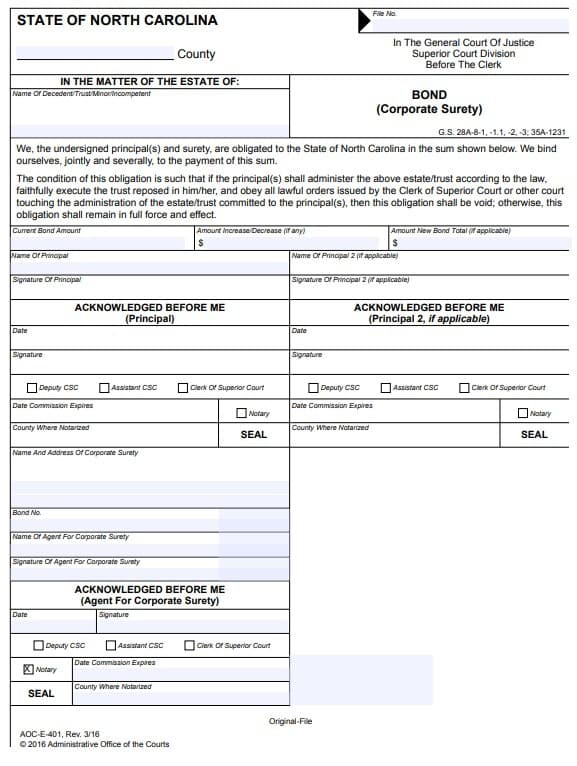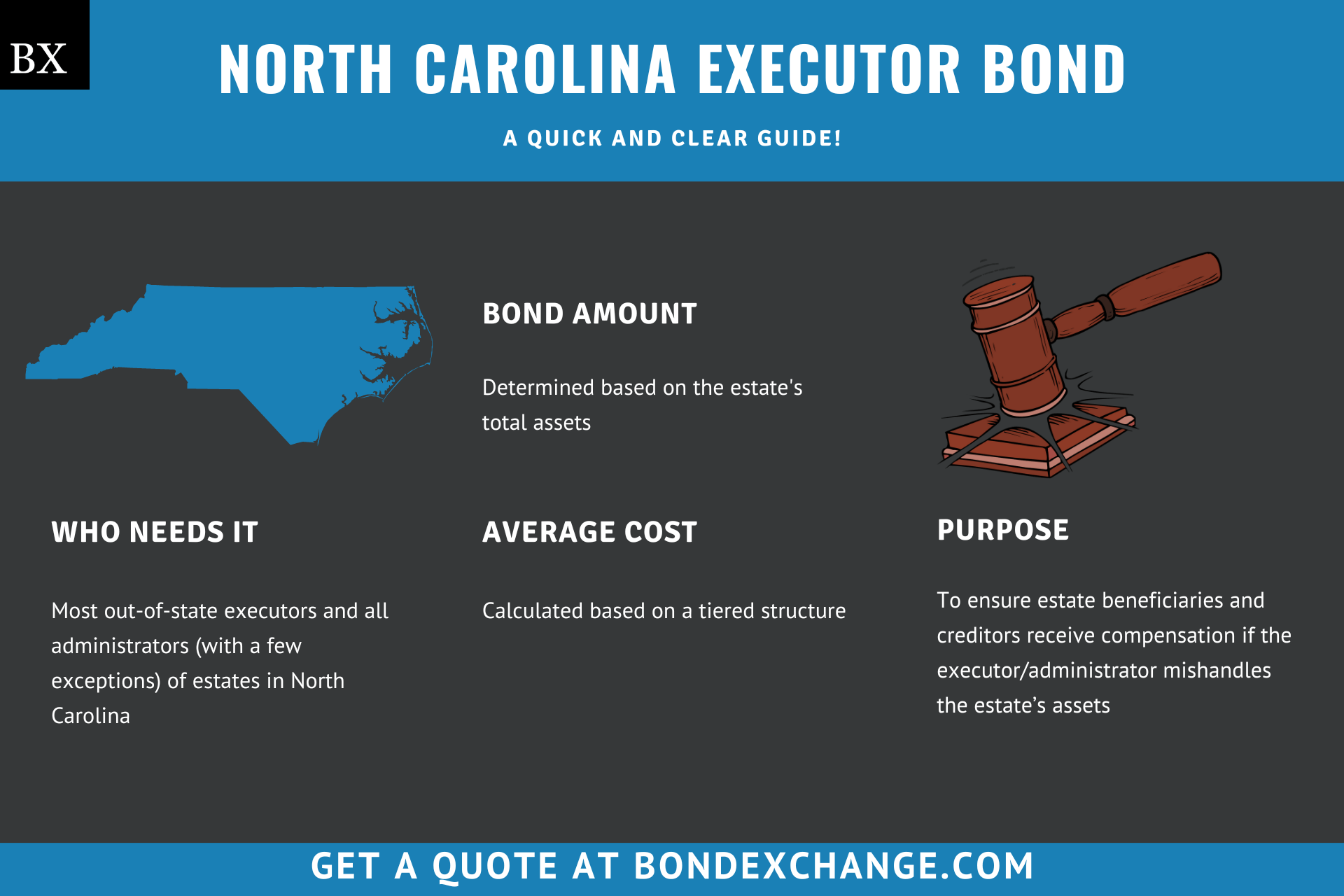North Carolina Executor Bond: A Comprehensive Guide
This guide provides information for insurance agents to help their customers obtain a North Carolina Executor bond.
At a Glance:
- Lowest Cost: Calculated based on a tiered structure
- Bond Amount: Determined on a case-by-case basis (more on this later)
- Who Needs it: Most out-of-state executors and all administrators (with a few exceptions) of estates in North Carolina
- Purpose: To ensure estate beneficiaries and creditors receive compensation if the executor/administrator mishandles the estate’s assets
- Who Regulates Executor Bonds in North Carolina: The clerk of the superior court of the county where the deceased person resided or had property

Background
North Carolina Statute Chapter 28A requires all executors and administrators of estates to become appointed as personal representatives by a superior court before assuming their fiduciary duties. The North Carolina legislature enacted the appointment requirement to ensure that executors/administrators do not mismanage the estate’s assets. To provide financial security for the enforcement of this requirement, most out-of-state executors and all administrators must purchase a probate surety bond before becoming appointed as personal representatives of an estate.
What is the Purpose of the North Carolina Executor Bond?
North Carolina requires estate executors and administrators to purchase a surety bond as a prerequisite to being appointed as a personal representative of an estate. The bond ensures that the estate’s beneficiaries and creditors will receive compensation for financial harm if the personal representative fails to abide by the regulations outlined in North Carolina Statute 28A-8-2. Specifically, the bond protects beneficiaries and creditors if the personal representative fails to adhere to all court orders or mismanages the estate’s assets. In short, the bond is a type of insurance that protects the estate’s beneficiaries and creditors if the executor or administrator violates their fiduciary duties.
How Can an Insurance Agent Obtain a North Carolina Executor Surety Bond?
BondExchange makes obtaining a North Carolina Executor bond easy. Simply login to your account and use our keyword search to find the “Executor” bond in our database. Don’t have a login? Gain access now and let us help you satisfy your customers’ needs. Our friendly underwriting staff is available by phone (800) 438-1162, email or chat from 7:30 AM to 7:00 PM EST to assist you.
At BondExchange, our 40 years of experience, leading technology, and access to markets ensures that we have the knowledge and resources to provide your clients with fast and friendly service whether obtaining quotes or issuing bonds.
Not an agent? Then let us pair you with one!

Click the above image to find a BX Agent near you
How is the Bond Amount Determined?
North Carolina Statute 28A-8-2 dictates that the bond amount for estates that are less than $100,000 must be equal to 125% of the estate’s assets. The bond amount for estates that are larger than $100,000 need only be 110% of the estate’s assets. Fiduciaries that choose not to purchase a surety bond must provide another form of financial security equal to 200% of the estate’s assets.
Can the Bond Amount be Adjusted?
Yes, as North Carolina Statute 28A-8-3 dictates that the clerk of the superior court may either increase or reduce the bond amount if they determine that doing so is justified.
What are the Underwriting Requirements for the North Carolina Executor Bond?
Most surety companies will examine the following factors when determining eligibility for the North Carolina Executor bond:
- Fiduciary’s credit history (not considered for bonds with limits less than $25,000)
- Whether or not the estate has an attorney (not considered for bonds with limits less than $25,000)
- How long the appointment is for
- Whether or not the executor/administrator is replacing a prior fiduciary
- If the fiduciary has ever committed a felony
- If there are disputes among the estate’s beneficiaries
- Whether or not there is any ongoing business in the estate
- If the bond is being required by a creditor
How Much Does the North Carolina Executor Bond Cost?
Surety companies typically determine the premium rate for executor bonds based on a tiered structure. As a result, larger bond amounts will be charged a lower premium rate than smaller bonds.
The following table illustrates the pricing structure for the North Carolina Executor bond:
$1,500,000 Executor Bond Cost
| Bond Amount | Premium Rate | Total Bond Cost |
|---|---|---|
| First $20,000 | 0.75% | $150 |
| Next $40,000 | 0.60% | $240 |
| Next $140,000 | 0.50% | $700 |
| Next $300,000 | 0.375% | $1,125 |
| Next $1,000,000 | 0.25% | $2,500 |
| Total cost of $4,715 |
Who is Required to Purchase the Bond?
North Carolina requires executors and administrators of estates to purchase surety bonds as a prerequisite to becoming personal representatives of an estate.
Executor bonds are not required for:
- Executors residing in North Carolina (unless the deceased’s will specifically requires one).
- Non-resident executors that have appointed a resident agent to accept service of process when the deceased’s will excuses non-resident executors from filing a bond.
- Non-resident executors when there is a coexecutor of the estate residing in North Carolina (unless the deceased’s will requires them to be bonded or the clerk of the superior court deems a bond to be necessary).
- Executors and administrators appointed for the sole purpose of bringing a wrongful death claim. However, a bond must be obtained once the deceased’s property is obtained.
- Executors and administrators that are licensed trust institutions
- Executors and administrators of estates of deceased North Carolina residents that did not leave a will if all of the deceased’s heirs are over 18 and agree to waive the bond requirement
- Executors and administrators that are the sole heirs of an estate
- Administrators with the will annexed that are North Carolina residents if all estate devisees agree to waive the bond requirement
A personal representative is considered an executor if the deceased explicitly appointed them as one in their will, and an administrator if the deceased died without a will.
BondExchange now offers monthly pay-as-you-go subscriptions for surety bonds. Your customers are able to purchase their bonds on a monthly basis and cancel them anytime. Learn more here.
How do North Carolina Executors and Administrators Become Personal Representatives?
Executors and administrators in North Carolina must navigate several steps to become appointed as personal representatives. Below are the general guidelines, but applicants should refer to the NC Judiciary Branch’s estate page for details on the process.
Step 1 – Meet the Qualifications
Executors and administrators are not qualified to serve as personal representatives if any of the following characteristics apply to them:
-
- Is under the age of 18
- Has been adjudged incompetent by the court
- Is a convicted felon who has not had their full citizenship restored
- Is a non-resident and has not appointed a resident agent to accept service of process
- Is a corporation that is not authorized to act as a personal representative
- Has committed acts that forfeit their right to serve
- Is a person that the clerk of the superior court finds unsuitable
- Was originally designated as the executor of the estate but choose not to serve
For estates without a will or where the deceased did not appoint an executor, qualified persons may apply to be an administrator in the following order:
-
- The surviving spouse
- Anyone outlined to receive property in the deceased’s will or entitled to receive property by law if there is no will
- Any next of kin
- Any creditor of the deceased
- Any person of good character living in the county where the superior court has jurisdiction
Step 2 – Hire an Attorney
Although not required, it is highly recommended that personal representatives hire an attorney to assist with the probate process. Personal representatives may use the estate’s assets to pay for all attorney fees, as long as the court deems the fees to be reasonable.
Step 3 – Gather all Relevant Documents
Executors and administrators should attempt to acquire all of the following documents before applying to be a personal representative:
-
- The deceased’s will (if applicable)
- Death certificate
- Detailed descriptions, including the locations, of all of the deceased’s assets
Step 4 – Complete the Application
To become a personal representative, executors and administrators must apply for either a letter testamentary (executor) or letter of administration (administrator) from the clerk of the superior court with jurisdiction over the estate. Executors and administrators must fill out all required forms, and pay a $120 filing fee, when submitting their applications.
Step 5 – Purchase a Surety Bond
Executors and administrators may be required to purchase and maintain a surety bond (limits outlined above).
Personal representatives of smaller estates do not have to complete the entire application process, but instead must complete a streamlined one. Additionally, surviving spouses that are the sole heirs of an estate may pursue summary administration, which is a further streamlined estate administration process.
How do North Carolina Executors and Administrators File Their Bonds?
Executors and administrators should submit their completed bond forms, including the power of attorney, to the clerk of the superior court with jurisdiction over the estate.
The surety bond requires signatures, including witness signatures, from both the surety company that issues the bond and from the applicant. The surety company should include the following information on the bond form:
- Name of the deceased
- Legal name of the entity/individual(s) buying the bond
- Surety company’s name and address
- Bond amount
- Date the bond is signed
What can North Carolina Executors and Administrators do to Avoid Claims Made Against Their Bonds?
To avoid claims against their bonds, executors and administrators in North Carolina must ensure that they:
- Perform all of their fiduciary duties
- Obey all court orders
- Do not mismanage the estate’s assets

